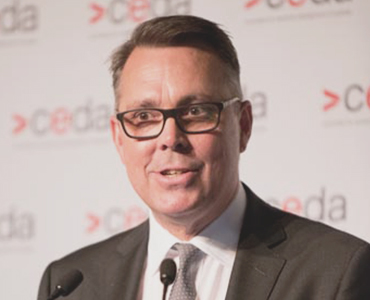Explore our Climate and Energy Hub
27/10/2016

Professor Dewar said there have been four iterations of the university system historically, and that tertiary education must fully transition to a new, digital-friendly iteration to maintain relevance in today’s society.
University 1.0 he described as, “The metaphysical university, in the service of God, that emerged in medieval times.
“The early stages of this university revolved around specialised communities, that eventually morphed into what we now know as the more traditional university of the liberal arts education.”
He said version 2.0 could be thought of as the research universities of the post-industrial society, which emerged as the focal point for research-driven scientific advancement. In the Australian context, he said the great post-war expansion of universities in Australia had a clear orientation to research in the service of economic development.
Version 3.0, he said, “Might be described as the entrepreneurial university. The university that operates for itself, serving many of the diverse functions of the 1.0 and 2.0, but first and foremost, it is concerned with optimising its own self-interest.”
He described University 4 .0 as “a new emerging case of university”, which could be dubbed the ecological university or the university for others.
Professor Dewar said there were several reasons why the university system change to 4.0 is inevitable.
“The first is that the world of work for which we’re preparing students is changing very quickly – we know this, and CEDA commissioned a report that talked about this. Automation will make many jobs obsolete before long,” he said.
“We know that many of the pathways into and through a working life are changing dramatically with many of the traditional pathways into the workforce disappearing.”
He said the skills employees seek today would be “unrecognisable to our parents”, in addition to the fact “major employers are no longer insisting on their graduate recruits being graduates at all”, listing the examples of Penguin Random House and EY dropping their demand that recruits have a degree.
He also said the shift was necessary based on the expectations of students, who are increasingly demanding the flexible delivery of their subjects.
From these factors, he posited University 4.0 would comprise the following four attributes:
- Universities will have a greater emphasis on on-demand learning, multiple modes of education, with a seamless blend between the different modes of: on campus, blended or wholly online.
- Universities will move away from degrees as the only form of credential they offer, and toward a mixed-offering of degrees plus shorter cycle qualifications and credentials. This shift will allow universities and their industry partners to co-create shorter cycle qualifications that respond to industry changes and move rapidly with the changing needs of the workforce.
- Universities will have a much stronger focus on career management for students, both while they’re at university and after they leave. This will go beyond traditional career advice and may include offers of post degree courses to “top up” their skills with short cycle degrees. This would help flesh-out graduates’ resumes based on industry demand and offer new skills which might not have been taught in the student’s core degree.
- Universities will become physical sites of seamless co-location and collaboration between industry and university-based researchers. Universities will act as the brokers of relationships between young entrepreneurs, and potential supporters, mentors, and funders.
“The trajectory I’ve described won’t be easy – we have a lot of infrastructure and a lot of industry frameworks that we will have to navigate our way through to become University 4.0 in the way I’ve described it,” he said.
“For that reason, universities will have to make a lot of very important decisions – and already are making a lot of very important decisions – about the business models they will employ to take advantage of the opportunities that these trends will present.
“And frankly, some universities will succeed really well, and others won’t, and I think we are about to enter a very interesting era in the history of universities.”
